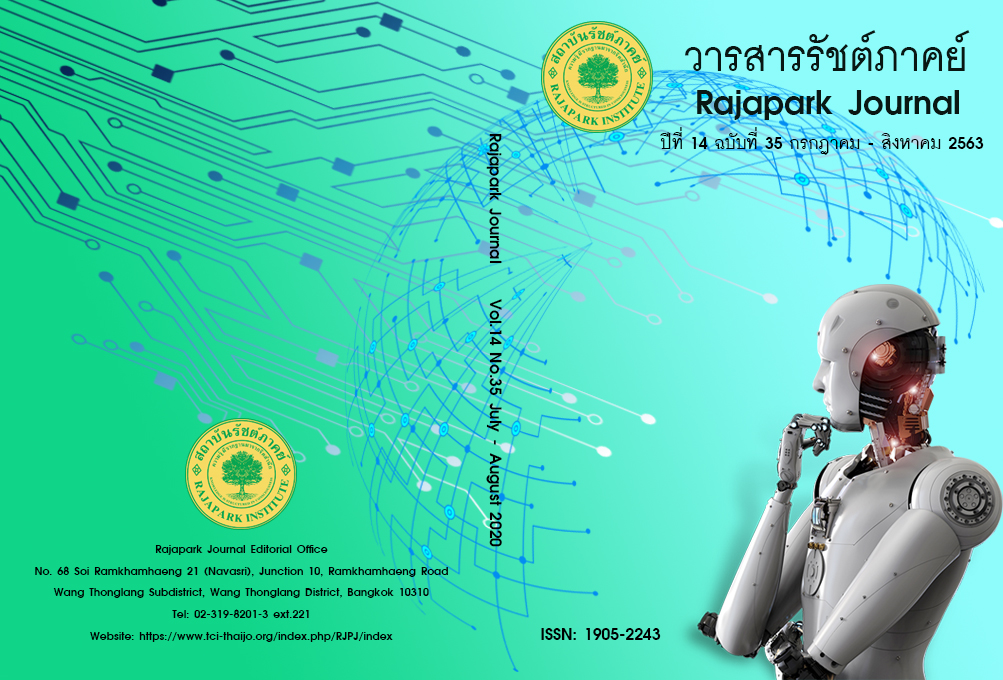Effective Capability Enhancement for Efficient Employees in Duty-Free Enterprise
Main Article Content
Abstract
This research aimed to 1) study the factors of effective capability enhancement for the efficient employees in a duty-free enterprise, and 2) create the model of effective capability enhancement for the efficient employees. In data collection, the informants from the business were combined with 3 groups of people: 1) a group of 5 human resource administrators, who got an in-depth interview; 2) a group of 20 recognized employees, who gave feedback for further study about significant factors of effective capability enhancement; and 3) a group of 5 supervisors, who was responsible for evaluation of the pattern of effective capability enhancement for the efficient employees and approval of a model. All methods for information collection included a semi-structured in-depth interview, a questionnaire for feedback, and an evaluation form on effective capability enhancement for the efficient employees. The overview reliability of the questionnaire for feedback was 0.96. The qualitative data were analyzed by content analysis and content validity ratio (CVR). The quantitative data were analyzed by statistical frequency, percentage, mean, and standard deviation. The results have been revealed that there were 2 key factors with 5 sub-factors in the model of effective capability enhancement for the efficient employees in the duty-free enterprise. The first key factor, which was the most significant, was self-development. The following factor was human resources development. These factors must work with organizational support dimension. The self-development factor comprised 2 sub-factors with a high significance level which were 1) Education and 2) Training. The human resources development factor comprised 3 sub-factors with a high significance level too, which were 1) Skill Development, 2) Knowledge Development, and 3) Effective Personal Characteristic Development. The model eventually has been approved consensus by the group of advisors as a guideline to enhance effectively the capability of the employees at a high level.
Article Details
Views and opinions appearing in the Journal it is the responsibility of the author of the article, and does not constitute the view and responsibility of the editorial team.
References
Boonnuch, R. (2012). Development and Training Affecting the Employee’s Effectiveness: Case Study Provincial Electricity Authority, Area 1 (Central Region) Phra Nakhorn Si Ayutthaya Province. Master of Business Administration. Rajamangala University of Technology Thanyaburi.
Cheerakan, K. (2012). Current competencies of human resources managers in Thai commercial banking group. Faculty of Public Administration, Dhurakij Pundit University.
Covey, S. R. (1989). The 7 Habits of Highly Effective People. New York: Simon & Schuster.
Delrojo, J. (2016). Unleash the Success Power of Your Mind. Retrieved December 20, 2019, from http://www.YourSuccessMind.com.
Hall, G. E., & Hord, S. M. (2010). Implementing Change: Patterns. Principles and Potholes. Boston: Allyn and Bacon.
Jackson, S. E., & Schuler, R. S. (2003). Managing Human Resource Through Strategic Partnerships (8th ed.). South-Western Masson.
Keawnu, S. (2011). Needs for Self-development, Personal Management Procedure and Factors to office Personnel, Self-development, Rajamangala University of Technology Sivijaya. Masterof Education in Human Resource Development. Rajamangala University of Technology Sivijaya.
McClelland, D. C. (1998). Identifying Competencies with Behavioral-Event Interview. Psychological Science, 9(5), 331-339.
Nadler, L. (1989). Corporate Human Resource Development. New York: Van Nostrand Reinhold Company.
Puvitayaphan, A. (2014). Training Implementation : Competency-Based. Bangkok : HR Center Company.
Silpcharu, T. (2014). Research and Statistical Analysis with SPSS and AMOS. (15th ed.). Nonthaburi: S.R. Printing Mass Product.
Simakorn, T. (2010). The Development of a Training Curriculum for Competencies Enhancement of Nurse Case Managers. Bangkok: Ramkhamhaeng University.
Smithikrai, C. (2013). The Recruitment, Selection and Performance Evaluation of Personnel. (4th ed.). Bangkok: Chulalongkorn University Press.
Spencer, L. M., & Spencer, S. M. (1993). Competence at Work. New York: Wiley.
Thanakitputimed, P. (2010). Desirable Characteristics of the High Graduates in Technical Education
Diploma with Requirement of Supervisor Enterprises in Samutsakhorn Industrial Estate. Master of Education Vocational Education Development. Kasetsart University.
Weber, M. (2009). An exploratory study identifying soft skill competencies in entry-level manager. Tourism and Hospitality Research, 9(4), 353-361.


